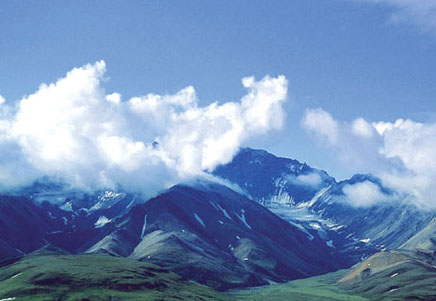| Home / Environment / News | Tools: Save | Print | E-mail | Most Read |
| Global Warming Threatens Roof of the World |
| Adjust font size: |
Shrinking glaciers, frozen earth melting, grasslands turning yellow, rivers drying up, scientists studying the effects of global warming on Tibet are deeply worried.
A group of scientists, organized by World Wildlife Fund (WWF), have just explored the source of the Yangtze River on the Qinghai-Tibet Plateau and reported alarming findings. And on Monday 2 July the Tibet weather authority recorded the highest July temperature in 30 years in Lhasa, the regional capital. "The glaciers at the source of the Yangtze River are shrinking much faster than we had anticipated," said Li Yajie, a scientist with the Nanjing Institute of Geography and Limnology under the Chinese Academy of Sciences, who visited the area in the 1980s and again in the 1990s. The breathtaking view of Mount Yuzhu and 14 other snowy peaks stuns passengers traveling along the Qinghai-Tibet railway. But those who enter a typical glacier valley west of Mount Yuzhu will no longer find any trace of a glacier at the snow line altitude of about 5,000 meters. In its place, a sliver of spring water bubbles its way down the flank of the mountain. Scientists found the remnants of the glacier on the far side of the mountain. "There are four stages in the disappearance of a glacier. Sadly, this glacier is already in the last stage," Li said. The Qinghai-Tibet Plateau used to boast 36,000 glaciers with an area of 50,000 sq km which feed several of the major rivers in China and Southeast Asia. In the past 100 years, the area of these glaciers has shrunk by 30 percent. Scientists say that if the temperature at the end of this century is 2.1 to 4 degrees Celsius higher than now -- a reasonable hypothesis given global warming trends -- this figure will increase to almost half. One of the most bitter paradoxes of global warming is the fact that global warming does not have a positive effect on water supply. As the glaciers melt, they provide water but most of this extra water is vaporized in the warmer weather, Li said. Data from the weather station along the Tuotuo River, the source of the Yangtze River, testifies to this. The whole of the Tanggula Range of mountains is suffering higher temperatures, lower rainfall and greater vaporization losses, an overall trend towards drier weather, said Lei Aiguo, deputy director of the weather station. Travelers on the Qinghai-Tibet highway have for years been troubled by the bumpy and sometimes chaotic surface of the road. The concrete surface of the highway at Wudaoliang, a small town at an altitude of 4,700 meters, is in very poor condition -- it looks as though some giants had smashed it angrily with enormous hammers. The melting of the frozen earth beneath the surface is the cause of 80 percent of the damage to the road on the Plateau. As the icy core of the earth melts, the road subsides. The warmer weather gradually releases carbon and hydrogen into the air from the frozen earth, affecting the regional and even the global climate, said Li Yajie. The melting of the frozen earth has also impacted vegetation at high altitudes. Over the past 40 years, water losses due to global warming and vaporization have reduced water volume in the earth in this region and the grassland is drying out, said Li Yuanshou, scientist from the Cold and Arid Regions Environmental and Engineering Research Institute of the Chinese Academy of Sciences, who has been monitoring the condition of the highland grasslands for three years. According to Li and his colleagues, 15 percent of rich grassland and one fourth of wetland at high altitude have vanished in the past 15 years. Lots of countries around the world, including China, have begun to make efforts to slow down global warming, Li Yajie said. "But the scale of the problem is such that every nation and every individual must get involved." The scientists called for more support for ecological research on the Qinghai-Tibet Plateau. They said that a foundation to attract public donations and help fund the research should be set up. "Whether it's the air, the land, the water or the fauna and flora, we still don't know enough about Tibet," Li said. "But we have to act now to protect that unique and vulnerable environment." (Xinhua News Agency July 8, 2007) |
| Tools: Save | Print | E-mail | Most Read |
 |
| Related Stories |
